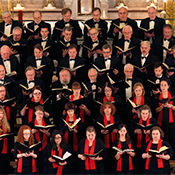
From Ensemble to Soloists: Milwaukee Symphony Chorus Members Shine
David Lewellen
PUBLISHED
Tagged Under: 2023.24 Season, Chorus
The Milwaukee Symphony Chorus (MSC) has fulfilled its mission of supplying choral power for the MSO for nearly half a century. This season, it has also begun providing vocal soloists.
After five MSC members stepped forward from the ensemble to solo in Handel’s Messiah in December, seven will also be featured in Bach’s Magnificat on March 23-24, during the orchestra’s Bach Fest.
“This has been heaven for me,” chorus director Cheryl Frazes Hill said recently. “It’s raising the confidence of our singers to have this opportunity.”
Music Director Ken-David Masur has done coaching sessions with both the soloists and their understudies. And the possibility of soloing is also motivating many singers to take voice lessons and to practice more frequently, which improves the overall level of the chorus.
Auditions in September were open to the entire chorus. Frazes Hill listened to the first round and took videos, then shared top candidates with Masur, who judged the final round at a live callback.
“This is really beneficial for someone in my position, as an emerging professional doing solos with a major orchestra,” said countertenor Scott Bass, who will sing the alto solo in Magnificat. At age 27, his voice is still developing, and usually he sings tenor in the MSC. “But I have a big range, and they can put me anywhere they need me,” he said. “Magnificat is written for five parts, and the alto part really fits my voice extremely well.”
The demands for group and solo singing are different. In the choir, Bass will be thinking about cohesion and communal feeling. But “the solos are a little respite of contemplation. They’re more personal.”
Soprano Olivia Pogodzinski, a voice major as an undergraduate, is now a practicing dentist in Milwaukee but is happy to also get a chance to solo with the MSO.
“I never wanted to do just one thing,” she said, and the predictable schedule of a dentist’s office leaves her evenings free for rehearsals and performances with the MSO and the Florentine Opera. But her operatic voice has to be modified in order to sing Bach appropriately. “I’m really enjoying it for what it forces me to do,” she said. “It’s really good for me to keep growing.”
“It takes a while for a symphony chorus to get into a Bach mentality,” Frazes Hill said. “It has to be a lighter approach, intensity without pressure. Muscle memory alone won’t work.”
The chorus is using about 80 singers for Magnificat – smaller than the MSC at full strength, but much larger than the ensemble size Bach would have had. “For this chorus, when we have more singers, we can actually sing lighter,” Frazes Hill said. “Too small of a vocal production doesn’t necessarily work with an orchestra even as lightly and sensitively as they can play.” And additionally, a larger group provides insurance against singers falling ill during cold and flu season.
Instead of using the choral terrace that runs around three sides of the stage, the chorus will be situated on risers directly behind the orchestra. Soloists will step forward for their big moments, and then rejoin the ensemble.
“You step into a different place when you walk up and solo,” said Ashley Suresh, who will be taking some of the soprano solos in Magnificat. She has sung operatic repertoire, too, but to sing Bach, she said, “you need to be flexible and precise. It’s very mathematical. You’re a turning wheel, and you can’t step off.”
Suresh joined the chorus 10 years ago, took a break for the pandemic and the birth of her first child, and rejoined in 2022. “I’ve been in choirs all my life,” she said. “I love choir, and I couldn’t imagine life without it.”



